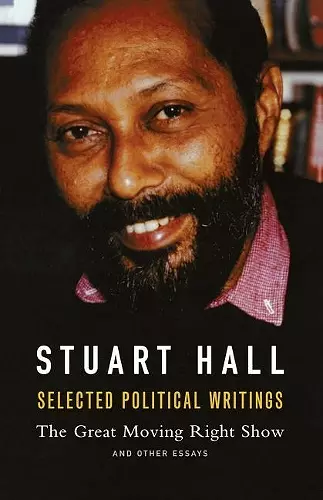Selected Political Writings
The Great Moving Right Show and Other Essays
Michael Rustin editor David Featherstone editor Sally Davison editor
Format:Paperback
Publisher:Lawrence & Wishart Ltd
Published:15th Jan '17
Should be back in stock very soon

In one sense, of course, all of Stuart Hall's writing was political, but this collection focuses on the essays he wrote throughout his life that directly engaged with the political issues of the day. From the beginning, his analyses focused strongly on the central role of culture in politics, and his insights are evident across the whole selection, whether he is writing about Thatcher's authoritarianism or the double shuffles of Tony Blair. These essays come from three broad periods: the 1950s and 1960s, when Hall was involved in the New Left; the 1970s and 1980s, when he evolved his critique of Thatcherism; and from the 1990s until the end of his life, when he focused on the emergence of neoliberalism. The editors have brought together the best and most representative works of a writer with a unique and conjunctural approach to understanding politics, and have collected those works that have a general application to broader political questions. The collection is therefore valuable for readers interested in the politics of the past sixty years, in specific political questions, such as around political commitment, or the politics of empire, and specific political moments, such as the Cuban Crisis, or the actions of New Labour. But Hall's engaging writing and the connections here between his more obviously political writing and the other areas of his work-including identity politics and race-also make the collection an essential resource for those interested in politics more generally.
'Hall's capacity to remind us that it was no less possible to think Britain without its empire than it was the colonies without the metropolitan "motherland" was a product of the changing conjunctures in which he lived his life. It was the quickening pace of decolonization, together with the escalation of the commonplace racism and racial violence against people of color in Britain in the mid-1960s, that pushed the legacies of colonialism to the forefront of Hall's work. The last colonial could only slowly decolonize his own thought.' 'That the British left has yet to decolonize--to fully understand the entanglement of capitalism and colonialism or the intersections of class and race they have created--was painfully evident from its struggle to make sense of the resurgence of white nationalism unleashed by Brexit. It is, as Hall wrote of the left at the height of Thatcherism, a hard road to renewal. Let's hope it is not also a long one.' James Vernon, Public Books 'By gathering together these pieces in one place this volume shows just how eager and unremitting Hall was in tackling the changing political dynamics of the time. Unafraid and unreserved in his analysis, the writing is full-on in it's speaking of truth to power. The style varies over time, but the sparkle and urgency remain throughout. As well as being described as a cultural theorist, Hall is often seen to be a public intellectual. Here we see these characteristics mixing together in a volatile but controlled cocktail. The potency of the voice and its immersion in political debates and dialogue is striking -- it is perhaps so striking because it is so unusual in its tenor and almost unique in its power. In this regard this collection is a call to engage as well as a guide in how to question our pressing political concerns. It demands involvement. It demands thoughtful and considered interaction -- without the need to pacify our critical edges. Hall's edge was certainly never dulled, not by time or by what might have appeared to be a potentially futile and harsh political landscape.' David Beer, Medium 'Davison, Featherstone, Rustin and Schwarz have done a magnificent job of capturing his ideas in this nearly fifty year evolution. Hall was drawn intuitively to Freudianism (with much of the British New Left) and deconstruction, precisely because the old truisms of the British class struggle--the working class triumph over a collapsing capitalism--had run dry. [...] Hall captured the status of the underclass effectively as he posed the political and social reality of the 1980s.' Paul Buhle, Labour and Working Class History Association (LAWCHA) The centerpiece essay is "The Great Moving Right Show," his 1979 analysis of Margaret Thatcher's "authoritarian populism." Her rise was as much a cultural turning point as a political one, in Hall's view--an enmity toward the struggling masses, obscured by her platform's projected attitude of tough, Victorian moderation. Many of the pieces in this collection orbit the topic of "common sense," how culture and politics together reinforce an idea of what is acceptable at any given time.' Hua Hsu, the New Yorker
ISBN: 9781910448656
Dimensions: unknown
Weight: unknown
256 pages